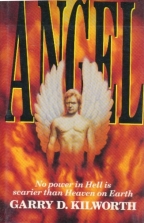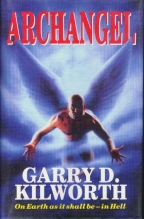Angel
Garry D. Kilworth
Gollancz Horror
UK Hardcover First
ISBN 0-575-05523-5
286 pages; $39.95

Archangel
Garry D. Kilworth
Gollancz Horror
UK Hardcover First
ISBN 0-575-05762-9
254 pages; 39.95
Reviewed by Rick Kleffel © 2001

REFERENCES
|
|
|
AngelGarry D. KilworthGollancz HorrorUK Hardcover FirstISBN 0-575-05523-5286 pages; $39.95 |
|
ArchangelGarry D. KilworthGollancz HorrorUK Hardcover FirstISBN 0-575-05762-9254 pages; 39.95Reviewed by Rick Kleffel © 2001 |
|
|
REFERENCES |
|
The popularity of angels in general culture has finally penetrated the horror genre in Garry D. Kilworth's two most recent novels, 'Angel' its sequel 'Archangel'. As we approach the millennium, people are grasping at any straw that offers hope, and the existence of angels offers hope that there is a supernatural force in the world inclined to do good rather than the traditional supernatural evils we are accustomed to finding in horror novels. British SF-novelist-turned-horror-writer Garry D. Kilworth turns that expectation on its head in the well-written and thoughtful 'Angel', a police procedural set in San Francisco, then follows it up with the hollow and sketchy 'Archangel'. It's a disappointing follow-up to a promising horror debut.
In 'Angel', San Francisco detective Dave Peters and his partner Danny Spitz are called upon to solve a string of arsons that have killed hundreds in the city. A beautiful man has been seen emerging from some of these fires unscathed, and as the detective try to follow the clues, it gradually emerges that the war between Heaven and Hell has moved to the earth. It seems some chicken demons have found a way off the battlefield and are hiding here, hoping to escape extinction at the hands of the angels. Unfortunately for them, and the people of San Francisco, an angels has been sent to extinguish them, and angel who is as careless about mere human lives as they are.
'Angel' is filled with good writing, and closely observed details of Peters' and Spitz's search for a supernatural being that is truly beyond good and evil. If that were all, it would be a good book; but Kilworth adds a fascinating moral dimension to his story, as the cops and the angel are changed by their experiences. But he does this in the context of a low-key follow-the-cops novel, contrasting the perceptions of the angels, the demons and the cops without getting pretentious or didactic. It's an impressive performance, and an enjoyable, terse novel.
Unfortunately, the mistakes that are avoided in 'Angel' are pursued in 'Archangel', the disappointing follow-up novel. Five years after the events in 'Angel', an Archangel has come to earth in London. However, rather than the low-key approach that worked so well in 'Angel', in 'Archangel', Kilworth offers up a pretentious and moralizing tale of mass destruction, hideous evil and trite, boring characters.
The archangel of the title is not a character as was the angel of the previous novel, but instead a holy, destructive light that takes out a few square miles of London without so much as a word. This Archangel, rather than the amoral killer of 'Angel', manages to mentally warn those who live in the area it intends to 'protect'. It has come to earth because the leaders of the major religions in the world are meeting secretly in London, in an attempt to come together. Word is out in heaven that Hell will try to disrupt this meeting, which the good guys want to come to fruition. Word is out that Hell will try employ the soul of an arsonist encountered in 'Angel', and that, while the Archangel can destroy this creature, it'll take most of London with it. So it's up to Dave and Danny, called over on special assignment, to pursue the evil soul and kill it before the Archangel is forced to act.
From the start, it is clear that 'Archangel' is going to be a sketchy, quick-draw McGraw affair. Dave and Danny retain their entertaining banter, and the prose is good, but the novel seems to have been written in a hurry, with big gaps in the logic and lots of details of gruesome killings supplied in their stead. It moves quite fast but works quite obviously, out in the open, with none of the surprises that are found 'Angel', and a couple of new characters that have as much depth as the cardboard standees used to advertise the latest Jason franchise, which seems to have been more of an inspiration than the first novel.
Kilworth is a skilled writer, and in both novels the prose is excellent, full of music and understatement. In 'Angel', he makes the best of a potentially uninteresting premise; in 'Archangel', he takes his interesting world and characters and puts them through the motions for a quick, pretentious thrill. Kilworth's promising beginning in 'Angel' is muddied by his hasty follow-up in 'Archangel'.